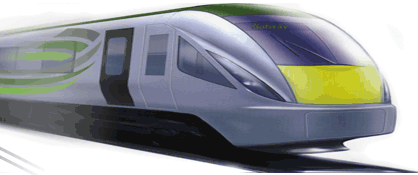West=On=Track
-News
Government Thinking on
Railways now on Right Track
The Irish Times 18th
September 2006
Mícheál Mac
Gréil, S.J.
Recent indications point to Cabinet approval for the
phased restoration of the Western Rail Corridor from
Limerick/Ennis to Collooney/Sligo. This is a major victory
for common sense and democracy, which grants a modicum of
fair play to the West of Ireland and is a concrete example
of balanced regional development.
This rail corridor will link Sligo to the major towns and
cities of the West, Mid-West, South-West and South of
Ireland, as well as connecting all the radial mainline
railways in and out of Dublin (apart from the Dublin-Belfast
line).
From a social and economic perspective the reopening of
the railway from Ennis to Collooney will involve the
provision of a major piece of transport infrastructure. By
generating development and facilitating commuters and
regular travellers, it will be both "front-loading"
infrastructure and responding to growing 'critical
mass'.
The Western Rail Corridor has significant freight
potential, particularly in relation to timber and
export-import liner trains from the West and North-West to
the major seaport of Waterford. The line also links the
three international airports of Ireland-West Knock, Shannon
and Cork.
When the environmental benefits of the greater use of
railways are added to the points already mentioned, the
wisdom of the Government's decision (supported by the
opposition parties) becomes crystal clear to any objective
observer.
The current developments have come about after a long and
arduous campaign, spearheaded by the Western Inter-County
Railway Committee, which focused in the first instance, on
preventing the removal of the track and preserving the
thoroughfare in public ownership. The section from
Claremorris to Collooney was not saved from abandonment
until a decision in the early '90s by the then Minister for
Transport, Mr. Séamus Brennan T.D. He gave an
assurance that the line would be preserved until the
Government reached a decision on its future, which it did in
November 2005 with the announcement of Transport 21.
By the late 1990s a new approach to railways was becoming
apparent. In Ireland, the Government invested in track
renewal, the upgrading of the main lines and the
re-introduction of light-rail transport in Dublin city. It
is worth noting that Iarnród Éireann's
engineers and permanent way division managed to deliver the
renewal programme on time and under budget, an unprecedented
achievement at the time.
The folly and short sightedness of the closures and
abandonment of previous decades were now exposed. The
decision makers failed to take the longer view at the time.
Two well-argued reports produced for our committee in 1981
and in 1992 were never taken seriously. In the context of
Transport 21 they make interesting reading today!
The evolution of the WRC's case over the past four years
was boosted by the establishment in 2003 of the West on
Track community campaign, which came about as a direct
result of the negative conclusions of the Strategic Rail
Review in relation to the Western Rail Corridor, and the
apparent lack of support for the WRC in CIÉ and
Iarnród Éireann. From the beginning the West
on Track campaign was strongly supported by statutory bodies
such as local and regional authorities, County Development
Boards, the BMW Regional Assembly and the Western
Development Commission.
West on Track and the Western Inter-County Railway
Committee worked closely together and succeeded in bringing
about the establishment by Minister Séamus Brennan of
an Expert Working Group under the Chairmanship of Pat
McCann. Both organisations were represented on the Working
Group.
The McCann Report (2005) formed part of the basis on
which the Government made its decision to re-open the
Western Rail Corridor in two phases i.e. Ennis to
Claremorris and Claremorris to Collooney.
It should be noted that the McCann Report stated that the
entire Ennis Claremorris section could be re-opened as a
single viable project were the case in regard to the
existence of rail freight traffic to be established.
However, since the report was published a new freight
service has been introduced between Ballina and Waterford,
carrying high-value freight cargoes for export. Every week
these four trains, together with eight Coillte pulpwood
trains, are required to travel through the greater Dublin
area. Opening the WRC will allow these freight services to
grow by taking a more direct and less congested route.
In conjunction with the first phase of the re-opening of
the railway from Ennis to Claremorris, the Government has
decided to clean, drain and fence the track bed from
Claremorris to Collooney. This work is due to commence this
Autumn, in preparation for an expected decision in 2008 to
re-open this section.
I believe that the re-opening of the railway at
Charlestown should be prioritised in view of the rapid
growth and development in the adjacent Ireland West Knock
International Airport.
It is important to view the coming development of the
Western Rail Corridor in the context of the ambitious
national plan to develop railways throughout the country.
All parts of Ireland have urgent transport needs but they
must never be seen to be competing against one another.
Indeed, the development of overland transport infrastructure
should be bi-modal i.e. rail and road. By developing the WRC
we are putting in place another important piece of national
infrastructure, one which will ultimately prove to be of
enormous benefit to all our citizens.
Dr. Mac Gréil is a former Senior Lecturer in
Sociology (NUI Maynooth) and author of the 1981 report on
the restoration of the Sligo-Limerick rail service. He
edited Monsignor James Horan's memoirs. He is
Joint-Secretary of the Western Inter-County Railway
Committee and Patron of West on Track.
|
